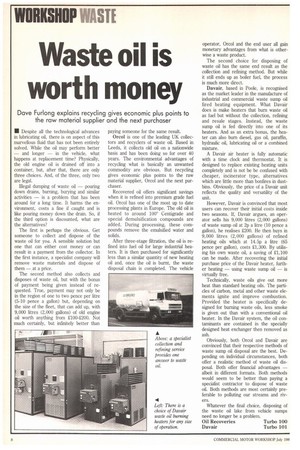Waste oil is worth money
Page 120

If you've noticed an error in this article please click here to report it so we can fix it.
Dave Furlong explains recycling gives economic plus points to the raw material supplier and the next purchaser
• Despite all the technological advances in lubricating oil, there is on aspect of this marvellous fluid that has not been entirely solved. While the oil may perform better — and longer — in the vehicle, what happens at replacement time? Physically, the old engine oil is drained off into a container, but, after that, there are only three choices. And, of the three, only two are legal.
Illegal dumping of waste oil — pouring down drains, burning, burying and similar activities — is a problem that has been around for a long time. It harms the environment, costs a fine if caught and is like pouring money down the drain. So, if the third option is discounted, what are the alternatives?
The first is perhaps the obvious. Get someone to collect and dispose of the waste oil for you. A sensible solution but one that can either cost money or can result in a payment from the collector. In the first instance, a specialist company will remove waste materials and dispose of them — at a price.
The second method also collects and disposes of waste oil, but with the bonus of payment being given instead of requested. True, payment may not only be in the region of one to two pence per litre (5-10 pence a gallon) but, depending on the size of the fleet, that can add up, with
9,000 litres (2000, gallons) of old engine oil worth anything from £1004200. Not much certainly, but infinitely better than
paying someone for the same result.
Orcol is one of the leading UK collectors and recyclers of waste oil. Based in Leeds, it collects old oil on a nationwide basis and has been doing so for over 40 years. The environmental advantages of recycling what is basically an unwanted commodity are obvious. But recycling Oyes economic plus points to the raw material supplier, Orcol and the next purchaser.
Recovered oil offers significant savings when it is refined into premium grade fuel oil. Orcol has one of the most up to date processing plants in Europe. The old oil is heated to around 100° Centigrade and special demulsification compounds are added. During processing, these compounds remove the emulsified water and solids.
After three-stage filtration, the oil is refined into fuel oil for large industrial heaters. It is then purchased for significantly less than a similar quantity of new heating oil and, once the oil is burnt, the waste disposal chain is completed. The vehicle operator, Orcol and the end user all gain monetary advantages from what is otherwise a waste product.
The second choice for disposing of waste oil has the same end result as the collection and refining method. But while it still ends up as boiler fuel, the process is much more direct.
Davair, based in Poole, is recognised as the market leader in the manufacture of industrial and commercial waste sump oil fired heating equipment. What Davair does is make heaters that burn waste oil as fuel but without the collection, refining and resale stages. Instead, the waste sump oil is fed directly into one of its heaters. And as an extra bonus, the heater can also burn diesel, gas oil, paraffin, hydraulic oil, lubricating oil or a combined mixture.
A Davair air heater is fully automatic with a time clock and thermostat. It is designed to replace existing heating units completely and is not be be confused with cheaper, incinerator type, alternatives which are little more than bonfires in dustbins. Obviously, the price of a Davair unit reflects the quality and versatility of the unit.
However, Davair is convinced that most users can recover their initial costs inside two seasons. If, Davair argues, an operator sells his 9,000 litres (2,000 gallons) of waste sump oil at 2p a litre (10 pence a gallon), he realises £200. He then buys in 9,000 litres (2,000 gallons) of refined heating oils which at 14.5p a litre (65 pence per gallon), costs £1,300. By utilising his own waste oil, a saving of £1,100 can be made. After recovering the initial purchase price of the Davair heater, further heating — using waste sump oil — is virtually free.
Technically, waste oils give out more heat than standard heating oils. The particles of carbon, metal and other waste elements ignite and improve combustion. Provided the heater is specifically designed for burning waste oils, less smoke is given out than with a conventional oil heater. In the Davair system, the oil contaminants are contained in the specially designed heat exchanger then removed as ash.
Obviously, both Orcol and Davair are convinced that their respective methods of waste sump oil disposal are the best. Depending on individual circumstances, both offer a realistic method of waste oil disposal. Both offer financial advantages — albeit in different formats. Both methods would seem to be better than paying a specialist contractor to dispose of waste oil. Both methods are most certainly preferable to polluting our streams and rivers.
Whatever the final choice, disposing of the waste oil lake from vehicle sumps need no longer be a problem.
Oil Recoveries Turbo 100 Davair Turbo 101




















































































































































